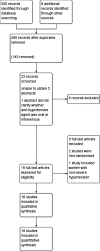Oral antihypertensive therapy for severe hypertension in pregnancy and postpartum: a systematic review
- PMID: 24832366
- PMCID: PMC4282072
- DOI: 10.1111/1471-0528.12737
Oral antihypertensive therapy for severe hypertension in pregnancy and postpartum: a systematic review
Abstract
Background: Pregnant and postpartum women with severe hypertension are at increased risk of stroke and require blood pressure (BP) reduction. Parenteral antihypertensives have been most commonly studied, but oral agents would be ideal for use in busy and resource-constrained settings.
Objectives: To review systematically, the effectiveness of oral antihypertensive agents for treatment of severe pregnancy/postpartum hypertension.
Search strategy: A systematic search of MEDLINE, EMBASE and the Cochrane Library was performed.
Selection criteria: Randomised controlled trials in pregnancy and postpartum with at least one arm consisting of a single oral antihypertensive agent to treat systolic BP ≥ 160 mmHg and/or diastolic BP ≥ 110 mmHg.
Data collection and analysis: Cochrane RevMan 5.1 was used to calculate relative risk (RR) and weighted mean difference by random effects.
Main results: We identified 15 randomised controlled trials (915 women) in pregnancy and one postpartum trial. Most trials in pregnancy compared oral/sublingual nifedipine capsules (8-10 mg) with another agent, usually parenteral hydralazine or labetalol. Nifedipine achieved treatment success in most women, similar to hydralazine (84% with nifedipine; relative risk [RR] 1.07, 95% confidence interval [95% CI] 0.98-1.17) or labetalol (100% with nifedipine; RR 1.02, 95% CI 0.95-1.09). Less than 2% of women treated with nifedipine experienced hypotension. There were no differences in adverse maternal or fetal outcomes. Target BP was achieved ~ 50% of the time with oral labetalol (100 mg) or methyldopa (250 mg) (47% labetelol versus 56% methyldopa; RR 0.85 95% CI 0.54-1.33).
Conclusions: Oral nifedipine, and possibly labetalol and methyldopa, are suitable options for treatment of severe hypertension in pregnancy/postpartum.
Keywords: Antihypertensive therapy; hypertensive disorders of pregnancy; oral agents; pregnancy; severe hypertension.
© 2014 The Authors BJOG An International Journal of Obstetrics and Gynaecology published by John Wiley & Sons Ltd on behalf of Royal College of Obstetricians and Gynaecologists.
Figures
Comment in
-
A report from #BlueJC: Should we use oral or parenteral medications for severe hypertension in pregnancy?BJOG. 2015 Jan;122(1):147. doi: 10.1111/1471-0528.13178. BJOG. 2015. PMID: 25545911 No abstract available.
References
-
- Magee LA, Helewa M, Moutquin JM, von Dadelszen P Hypertension Guideline Committee, Strategic Training Initiative in Research in the Reproductive Health Sciences (STIRRHS) Scholars. Diagnosis, evaluation, and management of the hypertensive disorders of pregnancy. J Obstet Gynaecol Can. 2008;30(Suppl 3):S1–48. - PubMed
-
- National Institute for Health and Clinical Excellence (NICE) Hypertension in Pregnancy: The management of hypertensive disorders during pregnancy. 2010;107:1–295. NICE clinical guideline.
-
- Society of Obstetric Medicine of Australia and New Zealand (SOMANZ) Guidelines for the management of hypertensive disorders of pregnancy. 2008. [ www.somanz.org/guidelines.asp ] - PubMed
-
- Martin JNJ, Thigpen BD, Moore RC, Rose CH, Cushman J, May W. Stroke and severe preeclampsia and eclampsia: a paradigm shift focusing on systolic blood pressure. Obstet Gynecol. 2005;105:246–54. - PubMed
-
- Centre for Maternal and Child Enquiries (CMACE) Saving Mothers' Lives: reviewing maternal deaths to make motherhood safer: 2006–08. The Eighth Report on Confidential Enquiries into Maternal Deaths in the United Kingdom. BJOG. 2011;118:1–203. - PubMed
Publication types
MeSH terms
Substances
LinkOut - more resources
Full Text Sources
Other Literature Sources
Medical



